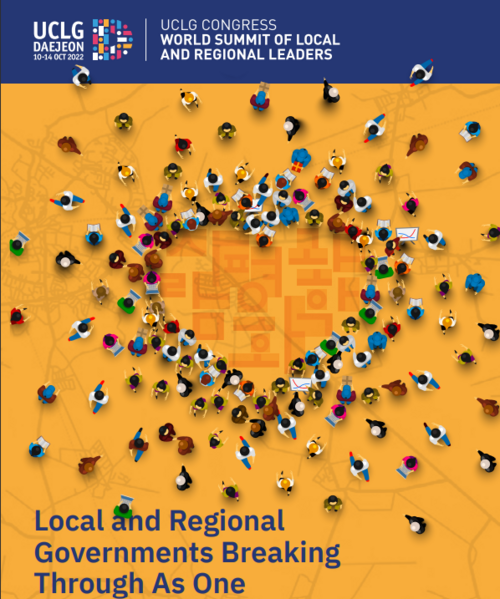UHC2030 is excited to welcome several new and distinguished...
5 December 2022
The recent UCLG Special Session on Health served as a perspective-sharing platform for both UHC2030 and local/regional governments to raise political awareness on universal health coverage ahead of the UN High-Level Meeting on Health in 2023.

The UCLG Special Session on Health themed, “The future of healthy cities: Working towards caring systems through universal health coverage”, took place on the 12th of October 2022, during the UCLG World Congress. The meeting moderator Dr. Justin Koonin, Co-Chair of the UHC 2030 Steering Committee, called the session “a meeting of two movements” bringing together healthy cities and universal health coverage. The session served as a perspective-sharing platform for both UHC2030 and local/regional governments carrying health measures on the ground, to raise political awareness on universal health coverage and healthy cities ahead of the UN High-Level Meeting on Health in 2023.
The Healthy Cities initiative is a strategic vehicle for health development and well-being in urban settings, and actions taken at the city level have a cross cutting relevance to the majority of technical areas of WHO’s work. UHC2030 and the Healthy City initiative provide a platform and mechanism for engaging and working with local/municipal governments and communities on issues impacting health and well-being. During the meeting María Fernanda Espinosa, President of the 73rd UN General Assembly and UHC2030 Political Advisor commenced by introducing the multilateral dimension of UHC, noting that over half of the world’s population is living in urban areas, and that health challenges include coverage but also go well beyond.
Local and regional governments participating in the session also highlighted how the rise of inequities, in part due to the pandemic and crisis in Ukraine, has also impacted health in our cities. This has been true not only in terms of quality healthcare access but also regarding life expectancy in low-income settings, as well as increased respiratory problems due to pollution and reduced access to food. María Sonia Gaya, Vice Mayor of Seville called for local and regional governments to address the social determinants of health: the economic, social, and political factors that can drive populations to better health. This sentiment was echoed by Santiago Saura, Councilor of Madrid. Both of whom spoke about the perspective of local governance within countries that had “achieved” universal health coverage.
In many cases, actions by local and regional governments have often gone beyond the scope and power of the position, testifying to a willingness to facilitate the implementation of systems and mechanisms aimed at improving population health. Examples of these actions include, reducing pollution, strengthening health systems for improved access to nutritious food through public kitchens and unemployment aid, effective vaccination campaigns for COVID-19 and other infectious diseases, and facilitating access to sanitary equipment, all measures developed by local and regional governments to ensure that communities were safe and healthy, regardless of the state of health coverage at national level.
Noraini Roslan, President of Klang Municipal Council, Malaysia brought up the environmental aspects of health speaking specifically about the impact of Dengue in her community. Daria Cibrario, from Public Service International, pointed to a gap between commitment and reality, in the 150 countries that have human rights enshrined in their constitutions. Ladislas Ngendahimana, from The Rwanda Association of Local Government Authorities, called for decentralization to create a conducive environment for the delivery of basic services, regardless of who the purveyor of health coverage is. Ms. Bongile Mbingo, the Mayor of Ezulwini, Eswatini, emphasized the importance of collaboration between local and regional governments and CSOs and locally driven initiatives. María Soledad Cisternas Reyes, UN Special Envoy on Disability and Accessibility brought to the table the perspectives of disabled communities. Florencio Venté, UN Major Group on Children and Youth and member of the UCLG Youth Caucus, highlighted the need to not forget and actively solicit young voices in the discussion.
As an equality driven movement and in synergy with UHC2030 and the Healthy Cities Programme, UCLG is standing ready to advocate for equal access to healthcare to accelerate progress toward UHC through health systems strengthening. For that, a Pact for the Future was adopted at the conclusion of the Daejeon Congress and builds on the UCLG commitments to equality and equity, with health being a critical aspect to overcoming the challenges that we are living through. It is critical that the organised constituency of local and regional governments rally around this goal, to meet the commitments undertaken since 2019 and to truly develop healthy cities and communities.
Local governments play a crucial role in delivering people-centered health services and building sustainable and effective health systems. Bringing together UHC2030 and Healthy Cities provides the right platforms and mechanisms for engaging and working with local/municipal governments and communities on issues impacting health and well-being.
Find out more about the UCLG World Congress here: DAEJEON UCLG CONGRESS 2022 (daejeon2022uclg.kr)
Find out more about the High-Level Meeting on Universal Health Coverage here.
Find out more about UHC Day on 12 December here.
Universal health coverage (UHC) means that all individuals and communities have access to quality essential health services without suffering financial hardship. The global commitment to achieve UHC is included as one of the SDG3 targets, cuts across all other health targets and has benefits beyond health in terms of social development and cohesion, economic prosperity and a better environment.
A Healthy City is one that puts health, social well-being, equity and sustainable development at the centre of local policies, strategies and programmes based on core values of the right to health and well-being, peace, social justice, gender equality, solidarity, social inclusion and sustainable development and guided by the principles of health for all, universal health coverage, intersectoral governance for health, health-in-all-policies, community participation, social cohesion and innovation.
